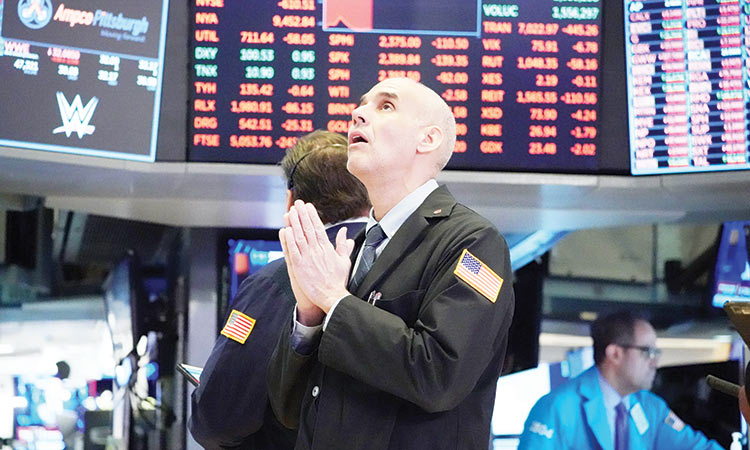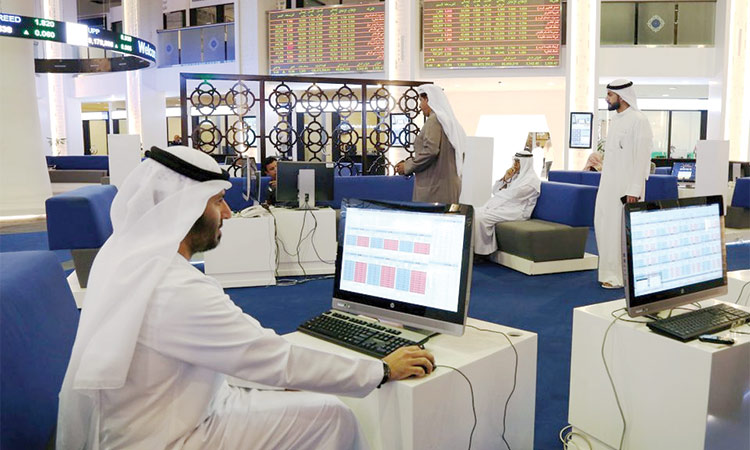Global stock markets plummet on disappointing earning data

The European and the Asian markets closed lower
Global stock markets tumbled on Wednesday following a batch of disappointing corporate results in the United States and Europe.
The slump came after US electric car giant Tesla -- one of the “Magnificent Seven” stocks that have fuelled a global rally this year -- reported a drop in second-quarter profits.
Wall Street’s main indices slumped, with the tech-heavy Nasdaq Composite index down 2.5 percent in late morning trading.
European and Asian markets closed lower.
“The reasons for the weakness are pretty clear cut,” said Briefing.com analyst Patrick O’Hare, pointing to Tesla’s report showing profits fell 45 percent in the second quarter owing to price cuts and aggressive AI investment.
Tesla shares tumbled more than 11 per cent.
Shares in Google-parent Alphabet fell around four percent, which O’Hare put down to lower-than-expected advertising revenue at YouTube, although overall the company beat profit and revenue expectations. Alphabet is also one of the so-called Magnificent Seven tech kings that have been key to driving gains in markets that have pushed Wall Street to multiple record highs in 2024.
The others -- Apple, Amazon, Facebook-parent Meta, Microsoft and Nvidia -- are due to report over the next few weeks.
“The first view on Big Tech earnings wasn’t inspiring,” said Ipek Ozkardeskaya, senior analyst at Swissquote Bank.
“Two of the Magnificent Seven stocks failed to create euphoria when they reported their second quarter results yesterday. The less-than-ideal set of earnings comes at a time when investors are questioning whether the AI rally has gotten ahead of itself,” she said.
Equities have largely been boosted this year by growing expectations that the US Federal Reserve will cut interest rates thanks to slowing inflation and a softening of the labour market.
The prospect of a more welcoming borrowing environment has heavily benefited tech firms, particularly as they have invested massively in AI, seeing it as the next big money-spinner.
“It is hard to see how the rally in markets can continue for now after several weaker than expected earnings reports including Tesla, LVMH and the US postal service,” said Kathleen Brooks, research director at trading platform XTB.
The latest corporate results “have led to concerns that stocks will fail to deliver the boost to earnings that would spur the next leg of the rally”, she added.
The Paris CAC 40 retreated 1.1 per cent, with shares in luxury giant LVMH falling 4.5 percent after it posted a 14-percent drop in net profit in the first half of the year.
The Frankfurt DAX was also in the red, shedding 0.9 percent, with Deutsche Bank sinking 8.6 percent after it reported a loss of 143 million euros ($155 million) in the second quarter.
Investors are also awaiting later this week the release of key US economic growth data and the latest reading on personal consumption expenditure -- the Fed’s favoured gauge of inflation -- which could play a role in decision-makers’ thinking ahead of their next meeting.
The yen jumped around 1.5 percent higher against the dollar.
“Attention is now turning to the Bank of Japan meeting next week, and there is growing speculation that the central bank will raise interest rates by ten basis points,” said market analyst Fawad Razaqzada at City Index and FOREX.com.
Traders are also treading cautiously as they weigh the outlook for US policy post-election, with Democratic chances boosted by the expected nomination of Kamala Harris to replace President Joe Biden to battle Donald Trump in November.
Eurozone business: Business activity in the eurozone slowed further in July, signalling a “near-stagnation” as the economy is weighed down by weakness in the manufacturing sector, a key survey showed Wednesday.
The HCOB Flash eurozone purchasing managers’ index (PMI) published by S&P Global recorded a figure of 50.1, down from 50.9 in June and its lowest level in five months.
Any reading above 50 indicates growth, while a figure below 50 shows contraction.
“Is this the summer lull? It feels a bit like it as the eurozone economy barely moved in July,” Cyrus de la Rubia, chief economist at Hamburg Commercial Bank (HCOB).
“The situation deteriorated significantly in the manufacturing sector and counteracted moderate growth in the services sector,” he added.
Despite the data, de la Rubia said “growth in the third quarter is still on the cards”.
The eurozone’s two biggest economies, Germany and France, “continued to underperform the wider region”, HCOB said, with both recording a contraction in activity in July.
Germany’s PMI fell to 48.7, significantly down from 50.4 but France’s economic activity recovered to reach 49.5 in July, up from 48.2 a month earlier.
De la Rubia said “while Germany is seemingly struggling to grow, the French economy is being fuelled by the Olympic Games”.
Economists said the data pointed to a sluggish recovery for the eurozone.
“While improving business sentiment in the first months of the year as well as better-than-expected GDP growth in the first quarter had supported hopes of a surprise recovery of the eurozone economy, the latest developments have proved to be something of a cold shower for those expectations,” ING Bank’s Carsten Brzeski said.
Agencies







